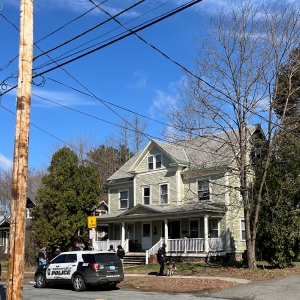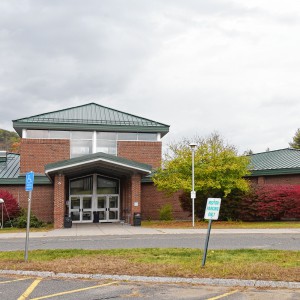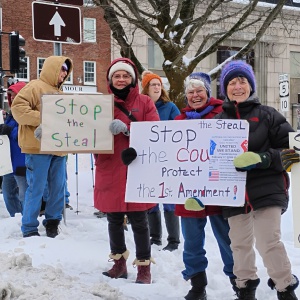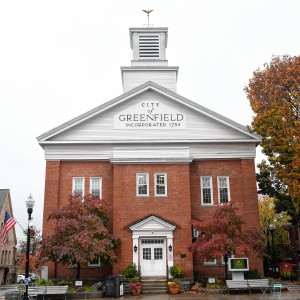Beacon Hill Roll Call: Feb. 10 to Feb. 14, 2025

| Published: 02-21-2025 12:43 PM |
Beacon Hill Roll Call records local senators’ votes on roll calls from the week of Feb. 10 to Feb. 14. There were no roll calls in the House last week.
The Senate, 33-6, approved a fiscal year 2025 supplemental budget that includes $425 million to fund the state’s emergency shelter system and make some changes to tighten eligibility for it.
The vote was almost strictly along party lines with all Republicans voting against it and all but one Democrat voting for it. The Democrats say the measure makes major reforms. The Republicans say although the bill includes some reforms they have long sought, it doesn’t go far enough. They all voted against it.
The House has already approved a different version of the bill and a House-Senate conference committee will likely hammer out a compromise version.
The bill would cap capacity in the shelter system at 4,000 families for the period Dec. 31, 2025 through Dec. 31, 2026. There were more than 6,000 families relying on the system at the end of January.
Other provisions reduce the maximum length in a shelter from nine to six consecutive months; phase out the use of hotels and motels for emergency housing by the end of this year; require a report on strategies to prevent homelessness and promote stable rehousing; and make temporary respite sites available to families who are eligible for the system for up to 30 days upon arrival in Massachusetts.
“Today we struck a balance between our fiscal responsibility to Massachusetts taxpayers and our moral obligation to moms, dads and kids who are in a difficult moment,” said Senate President Karen Spilka, D-Ashland. “We prioritize Massachusetts families in need, ensure transparency in the program and lay the groundwork for long-term solutions to homelessness.”
“I’m pleased that the Senate has passed this supplemental budget to provide funding and further clarify supportive services for unhoused families,” said Sen. Mike Rodrigues, D-Westport, chair of the Senate Committee on Ways and Means. “These adjustments will allow families to transfer out of these temporary housing units more readily, continue our track of providing sustainable employment and provide a glide path for exiting the system.”
Article continues after...
Yesterday's Most Read Articles
 Two arrested on drug trafficking charges in Greenfield
Two arrested on drug trafficking charges in Greenfield
 Berkshire DA says no crime occurred in student-officer relationship at Mohawk Trail
Berkshire DA says no crime occurred in student-officer relationship at Mohawk Trail
 Four Red Fire Farm workers arrested as part of ICE operation in Springfield
Four Red Fire Farm workers arrested as part of ICE operation in Springfield
 Incandescent Brewing now open in Bernardston
Incandescent Brewing now open in Bernardston
 Local ‘Hands Off!’ standouts planned as part of national effort
Local ‘Hands Off!’ standouts planned as part of national effort
 Proposed ordinance would make Greenfield a ‘sanctuary city’ for trans, gender-diverse people
Proposed ordinance would make Greenfield a ‘sanctuary city’ for trans, gender-diverse people
“I strongly oppose spending an additional $425 million on the unaccountable, unsustainable [emergency assistance] shelter program,” said Sen. Ryan Fattman, R-Sutton. “For years, I have sounded the alarm bell that the right-to-shelter law is in desperate need of reform.”
Sen. Patrick O’Connor, R-Weymouth, said he voted against the bill, as he has voted against every spending bill that has included exorbitant funding for the shelter system since a migrant crisis emerged in late 2023.
“Simply put, our state cannot afford to keep pouring massive sums of money into this unsustainable system,” O’Connor said. “We need serious reforms to our EA shelter system and our right-to-shelter law, which is why I’ve also filed a bill to restrict the right to shelter to Massachusetts residents — as was the original intent of the law. It is my hope that we will achieve significant reforms to the EA shelter system that will ensure its long-term fiscal sustainability and protect this valuable resource for Massachusetts residents.”
A “Yes” vote is for the bill.
Sen. Joanne Comerford — Yes
Sen. Paul Mark — Yes
The Senate, 38-0, approved an amendment that would require the Executive Office of Housing and Livable Communities, in conjunction with the Massachusetts State Police, to study the feasibility of conducting a National Crime Information Center background check on each adult or beneficiary applying for the emergency shelter program.
“It should be our goal to verify that individuals with violent criminal backgrounds are not endangering others in our temporary emergency shelter system,” said amendment sponsor Sen. Michael Moore, D-Millbury. “If adopted, this amendment would help us review each applicant’s history more thoroughly, including offenses from outside of the commonwealth.”
A “Yes” vote is for the amendment.
Sen. Joanne Comerford — Yes
Sen. Paul Mark — Yes
The Senate, 8-30, rejected an amendment that would require the state to prioritize giving long-term shelter to legal Massachusetts residents whose initial cause of homelessness and application for shelter occurred while they were residing legally in Massachusetts.
Amendment supporters said it is fair to give Massachusetts residents priority over people who recently came here from other states.
Sen. Peter Durant, R-Spencer, the sponsor of the amendment, did not respond to repeated requests by Beacon Hill Roll Call asking him to comment on the defeat of his amendment.
Sen. Mike Rodrigues, D-Westport, said the amendment is extremely broad and applies not only to emergency assistance but to all state-funded housing programs. He noted it could cause confusion and negatively impact residents at state housing.
A ”No” vote is against giving priority to Massachusetts residents.
Sen. Joanne Comerford — No
Sen. Paul Mark — No
The Senate, 6-32, rejected an amendment that would require that to be eligible for benefits under the emergency assistance shelter program, an applicant must have resided in Massachusetts for 12 consecutive months immediately prior to the date of their application. The applicant must also provide an acceptable form of verification such as tax returns; a Massachusetts REAL ID; a utility bill; a lease or mortgage; or pay stubs showing Massachusetts employment. The residency requirement would not apply to victims of domestic violence or to any person whose living situation has been affected by a fire or other natural disaster that occurred in Massachusetts.
Amendment supporters said the amendment is fair and makes it easy to prove a 12-month residency.
Sen. Bruce Tarr, R-Gloucester, the sponsor of the amendment, did not respond to repeated requests by Beacon Hill Roll Call asking him to comment on the defeat of his amendment.
Sen. Will Brownsberger, D-Belmont, said the amendment is unconstitutional and immoral. He said the U.S. Supreme Court and the state’s Supreme Judicial Court have ruled that a state cannot discriminate against people who have not lived in the state very long.
A “No” vote is against the 12-month residency requirement.
Sen. Joanne Comerford — No
Sen. Paul Mark — No
The Senate, 6-32, rejected an amendment that would have required an independent review of the emergency assistance shelter program by the inspector general to help identify savings and potential cost recovery.
“Two things about the emergency assistance shelter system are clear. First, the costs have skyrocketed well beyond the point of sustainability, and second, we would benefit from fresh eyes and an independent review of the system to help improve the program’s financial sustainability and effectiveness,” said amendment sponsor Sen. Becca Rausch, D-Needham. “We need this review, particularly as additional changes are made to further restrict access to the system, even as we have not seen any cost savings by prior access restriction changes, perhaps because those further imposed rules and restrictions raise administrative costs. The inspector general and his team are trained experts in this type of work and it is squarely within their jurisdiction to do the work described in this amendment.”
Sen. Mike Rodrigues, D-Westport, said the Inspector General’s Office is an independent body not beholden to the Legislature and already has the power to inspect any state agency. He said it is not the role of the Legislature to direct the inspector general on what to inspect.
A “No” vote is against requiring the review.
Sen. Joanne Comerford — No
Sen. Paul Mark — No
The Senate, 6-32, rejected an amendment that would require the Senate Committee on Post Audit and Oversight to investigate the emergency shelter program’s security lapses and shortcomings, which amendment supporters say have compromised public safety, health and security.
“There are still so many unanswered questions about the emergency shelter system,” said amendment sponsor Sen. Ryan Fattman, R-Sutton. “We still don’t have answers on the process to admit families into shelters, where money is being spent and how public safety issues are addressed. The purpose of the Senate Committee on Post Audit and Oversight is to audit the performance of legislative programs, like the emergency shelter system. This amendment would have provided transparency to both the Legislature and the public, and it is unfortunate that it was not passed.”
Amendment opponents said it’s not the job of senators to direct a Senate committee on how to do its job. They noted that the bill itself already makes safety reforms a priority and includes background checks.
A “No” vote is against the amendment.
Sen. Joanne Comerford — No
Sen. Paul Mark — No
The Senate, 39-0, adopted and sent to the House for consideration joint House-Senate rules for the 2025-2026 session.
Provisions include increasing the time for notifying the public about joint committee hearings from 72 hours to five days; requiring that all first meetings of a conference committee be open to the public and media; requiring at least one full day between a conference committee report filing and a legislative vote on the report; requiring sponsors of all bills to submit bill summaries that must be made publicly available alongside the bill text; changing the name of the Committee on Telecommunications, Utilities and Energy to the Committee on Climate, Utilities and Energy; the Committee on Elder Affairs to the Committee on Aging and Independence; and the Committee on Agriculture to the Committee on Agriculture and Fisheries.
“These changes would provide more opportunity to residents to participate in the Legislature’s work, encourage greater insight into bills being considered by the Legislature and provide more transparency on legislators’ positions on issues that impact Massachusetts residents,” said Senate President Karen Spilka, D-Ashland.
“This comprehensive rule proposal was a collaborative effort that makes the work we do here in the Senate more transparent, more efficient and respectful to the needs of members and residents,” said Sen. Joan Lovely, D-Salem, chair of the Senate Committee on Rules. “We are proud of the Senate’s work, and we want people to know what is going on in The People’s House. These measures take meaningful steps toward a more transparent Legislature and allow for more access to information by members of the public about our work, including easier participation.”
A “Yes” vote is for the rules package.
Sen. Joanne Comerford — Yes
Sen. Paul Mark — Yes
The Senate, 5-33, rejected an amendment that would allow members 48 hours to read the conference committee version of a bill. A conference version of a bill is the compromise version that is hammered out by a joint House-Senate committee when the House and Senate approve different versions of legislation.
“I voted for this amendment … because it ensures that both the appointed conference committee members and the public have sufficient time to understand and evaluate complex bills before they are voted on,” said Sen. Kelly Dooner, R-Taunton. “By setting a clear deadline and allowing more time to analyze the final conference report, this change promotes transparency to the public and helps prevent the Legislature from acting without proper deliberation and input from our communities.”
Sen. Bruce Tarr, R-Gloucester, the sponsor of the amendment, did not respond to repeated requests by Beacon Hill Roll Call asking him to comment on the defeat of his amendment.
Sen. Joan Lovely, D-Salem, said the bill already allows one calendar day for members to read a conference committee bill and argued that is a sufficient amount of time.
A “No” vote is against the 48 hours.
Sen. Joanne Comerford — No
Sen. Paul Mark — No
The Senate, 9-29, rejected an amendment that would require that a roll call vote be held on all conference committee versions of a bill.
“Constituents frequently ask how I have voted on major bills and how my colleagues have voted,” said amendment sponsor Sen. John Keenan, D-Quincy. “This amendment sought to ensure the people we represent know how we vote on important matters like conference committee reports.”
Sen. Joan Lovely, D-Salem, said this new rule is not necessary because members already have the opportunity to ask for a roll call vote when a conference committee bill comes before the Senate.
A “No” vote is against requiring a roll call vote.
Sen. Joanne Comerford — No
Sen. Paul Mark — No
The Senate, 38-0, approved an amendment to a rule that would prohibit legislators from purchasing, directly or indirectly, the stock or other securities of any corporation or association, knowing that there is pending before the Legislature any measure “granting the corporation or association any immunity, exemption, privilege or benefit or any measure providing for the creation of, or directly affecting any, contractual relations between the corporation or association and the state.”
The amendment would expand the ban to include any immediate family member of a legislator.
“Public service needs to be as far removed from unfair financial incentives and advantages as possible,” said amendment sponsor Sen. John Keenan, D-Quincy. “The commonwealth already prohibits legislators from buying stock based on the information they learn through their work at the State House, but this amendment, which the Senate adopted on a unanimous roll call vote, will also prohibit legislators using this information to sell stock and will restrict their family members from making similar financial transactions based on knowledge legislators have gained as a result of their positions.”
A “Yes” vote is for the amendment expanding the ban to apply to immediate family members.
Sen. Joanne Comerford — Yes
Sen. Paul Mark — Yes
U.S. Attorney Leah Foley announced that the U.S. Attorney’s Office for the District of Massachusetts collected $60.17 million in criminal and civil actions in fiscal year 2024, including $19.56 million in criminal actions and $40.6 million in civil actions.
“The American people deserve a government that is both accountable and effective in protecting their hard-earned tax dollars,” Foley said. “These substantial recoveries reflect our unwavering commitment to protecting taxpayer dollars, holding wrongdoers accountable, and securing justice for victims of fraud and other offenses. Whether through civil enforcement, asset recovery or criminal prosecution, our office will continue to aggressively pursue those who seek to defraud the government and exploit the public.”
Gov. Maura Healey announced $158 million in low-income housing tax credit and subsidy awards for 14 affordable housing projects. These awards are aimed at supporting the production and preservation of 1,138 affordable units for seniors and families.
“High housing costs are one of the biggest challenges facing Massachusetts residents,” Healey said. “Our administration is refusing to kick the can down the road. We need to increase housing production across the state to lower costs — and these affordable housing awards will help us get there. Because of our tax cuts package, we are able to give out more funding than ever before, which will directly support the creation of more than 1,000 affordable homes for seniors and families across our state.”
Rep. Michael Soter, R-Bellingham, filed legislation that would exclude tipped wages from taxable income. The measure is aimed at providing tax relief for service industry workers who rely on tips as a major source of their earnings. By excluding tipped wages from state income tax calculations, the bill would allow workers in restaurants, hospitality and other tipped professions to take home more of their income.
“This last election, the service industry made it clear that they would rather keep tips than have the government set an hourly rate,” Soter said. “This is an industry full of hardworking individuals that deserve to keep all their hard-earned money by not taxing tips. These servers and the industry were hit the hardest after COVID, and this would give much relief to these hardworking citizens who deal with such unpredictable weekly incomes.”






 Literacy Project celebrating 40 years of education
Literacy Project celebrating 40 years of education River Rat Race returns for 60th year on April 12
River Rat Race returns for 60th year on April 12 Backyard Oasis, connecting older adults with podcasts, celebrates 50 episodes
Backyard Oasis, connecting older adults with podcasts, celebrates 50 episodes
